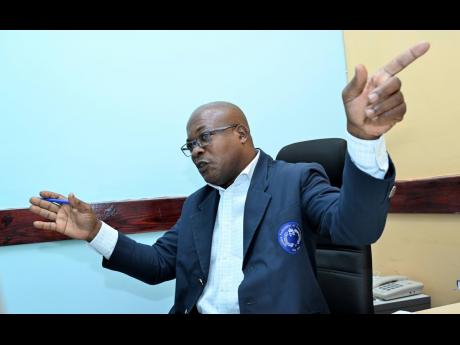Prisons breaking
Corrections union warns physical infrastructure on verge of collapse
Declaring that it is only a matter of time before some of Jamaica’s correctional facilities crumble, chairman of the Jamaica Federation of Corrections Arlington Turner says correctional officers and prisoners are existing in poor conditions behind bars.
Turner is insisting that much of the infrastructure needs attention and will not hold up for much longer.
“We should not wait until our prisons crumble around us and kill some of us as officers and kill some of our inmates … what we have existing now, it’s not good. It will not hold for very long,” the union boss said.
He said that because of the vulnerable structures and the inhumane conditions that exist at especially the Tower Street Adult Correctional Centre in Kingston and the St Catherine Adult Correctional Centre in Spanish Town, staff turnover is high.
Additionally, he described them as a breeding ground for hardened criminals and said further that the ratio of correctional officers to prisoners is inadequate, noting that if 300 correctional officers are recruited, at least 100 leave “in a short space of time”.
Due to security reasons, he would not divulge the current ratio.
Jamaica has 10 prisons and detention centres catering to more than 3,700 inmates. Both Tower Street and St Catherine house 70 per cent of the prisoners. Each is overpopulated by between 30 per cent and 40 per cent. Tower Street is 179 years old and St Catherine 370 years, having started as a slave barracoon.
“We’re not talking about [building] a hotel, but you have to ensure that when the courts place persons in prisons, they are sent there to remain there until such a time for their release.
“It doesn’t mean that you must throw them in a space and say ‘Let them suffer. They should not have anything’. You must ensure that these persons’ human rights are [upheld],” Turner told The Gleaner last Tuesday at his office.
Declared uninhabitable
He said that there are sections at Tower Street that have been declared uninhabitable because of poor and dangerous conditions.
He said Jamaicans would find it difficult to understand the conditions behind bars and how they contribute significantly to recidivism.
“If you put four or five persons within a space – and I cannot tell you the measurement for security reasons – you are breeding more criminals. You have persons who come to prison on a simple mistake, but because of how he was located and who he was located with, he comes out worse than he went in,” said Turner.
Prime Minister Andrew Holness, two weeks ago, said his administration had discussed the construction of a new maximum security facility but also considered the drawbacks that would come with such a move.
He said that aside from budgetary constraints, there would be political blowback though he and the police disclosed that several crimes have their roots of origin behind bars, including the August 11 Cherry Tree Lane massacre in which eight people were killed and several others injured.
Further, the Government has not given the status of a more than two-year-old proposal by a private group to build, own, operate, and, eventually, transfer (BOOT) a state-of-the-art facility, for which the Government would annually pay no more than what it currently spends on the upkeep of the correctional services.
The United States Department of State country report on Jamaica has painted a grim picture of conditions behind bars and at detention centres.
It called conditions “harsh and life-threatening” because of gross overcrowding, physical abuse, limited food, poor sanitary conditions, inadequate medical care, and poor administration.
It reported that prisoners with mental disabilities and children in juvenile correctional facilities represented the most vulnerable populations facing harsh conditions.
Further, it said correctional facilities were significantly overcrowded, and, at times, cells in the maximum-security facility at Tower Street held three times the intended capacity.
“Cells were dark and dirty, with poor bathroom and toilet facilities and limited ventilation,” the State Department said.
It said allegations of abuse were particularly frequent at juvenile detention centres, while prisoner-on-prisoner violence was common, including severe violence against prisoners targeted for their perceived lesbian, gay, bisexual, transgender, queer, or intersex (LGBTQI+) identity.
Prisoners, sometimes, did not receive required medication, including medication for HIV, according to the UN Program on HIV and AIDS, the State Department said.
It said independent authorities investigated allegations of abuse and inhuman conditions but noted that investigations were infrequent, and the number of official complaints likely underrepresented the scope of the problems, according to a human rights NGO.
“We have to understand that any country that is growing must look at infrastructure in terms of ‘You must have schools, of course. Your roads must be fixed. Your hospitals should be up and running’ but you cannot omit having prisons, and it must be in accordance with the human rights and not in breach,” said Turner, adding that there are mentally ill inmates behind bars.
“Whatever government, whatever administration, we need a new prison. This is not the time for talk anymore. We need a new maximum-security prison. If this is not happening, then we’re going to have issues [similar] to Haiti. You have been seeing and hearing about the prison breaks in Haiti. The infrastructure is not good,” Turner said.

